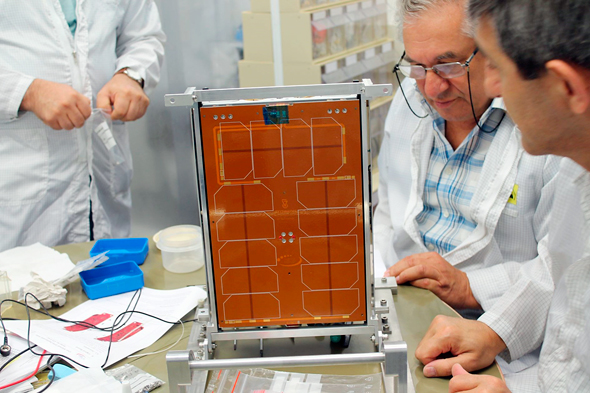IAI and Technion co-develop micro-satellites to aid search and rescue missions from space
The receiver for the ADELIS-SAMSON project was developed and built by ELTA Systems, a division of IAI
The three satellites will fly in orbit without human intervention and can receive signals from Earth, process them and as a result detect the exact location the signals originated from, capabilities that can be used to to help search and rescue operations, conduct remote sensing, and carry out environmental monitoring missions.
 Hovik Agalarian, Chief Electronics Engineer of the Asher Institute of Space Research Photo: Sharon Tzur, Technion’s Spokesperson Office
Hovik Agalarian, Chief Electronics Engineer of the Asher Institute of Space Research Photo: Sharon Tzur, Technion’s Spokesperson Office The receiver for the ADELIS-SAMSON project was developed and built by ELTA Systems, a division of IAI. It is designed to pick up and identify records from Earth and integrate them with three mission computers developed by IAI’s MABAT Division. The miniature system extends the scope of the missions the nano-satellites can perform.
“The new development will help promote a new field of space research,” said Nimrod Sheffer, CEO of IAI. “Collaboration with the Technion and other academic institutions is invaluable to us, as it promotes academic research and our future technological ventures. The receiver developed for this project offers a new way for space geo-location of ground-based electromagnetic signals. It is based on IAI’s extensive engineering know-how and experience in satellites, electronic warfare, intelligence interpretation systems, and communication networks.”
The ADELIS-SAMSON project was led by Professor Pini Gurfil, head of the Asher Space Research Institute and a faculty member in Technion’s Aerospace Engineering. He worked alongside Avner Kaidar, Eviatar Edlerman, Dr. Alex Frid, and Hovik Agalarian (pictured).
- Orbit inks $46 million deal to provide communications management system for Lockheed Martin’s F-16 jets
- Who is opening a center for mini spy satellites and why does Japan's largest bank need Israeli AI?
- Rafael to open Tel Aviv space center for mini spy satellite development
“We worked closely with IAI engineers on this development for more than five years,” said Prof. Gurfil in a statement. “The project showcases the benefits of academy-industry collaboration, which yielded an outstanding result in the form of an innovative space-borne system. We thank IAI engineers for their professionalism and commitment. The system we co-developed places ADELIS-SAMSON at the forefront of nano-satellite technology.”
The project is supported by the ADELIS Foundation, the Goldstein Foundation, and Israel's Space Agency.



